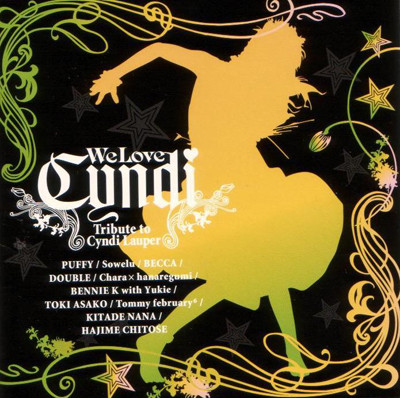Hai Fidelity
We Love Cyndi
by Rachael Carothers,

 |
Click below for a clip of the song "Time After Time " |
Get the Flash Player to see this player. |
Cyndi Lauper is an amazingly talented singer/songwriter. She has proven her worth, not only in the United States, but around the world as well. In honor of this wonderful woman, a Japanese tribute album, titled We Love Cyndi, was released on July 23, 2008. The album, entirely in English, features ten songs from artists such as Puffy (known as Puffy AmiYumi in the U.S.), Tommy February6, and others. Are the Japanese artists up for the challenge of an English language cover album?
Puffy begins the album with their version of “Girls Just Want To Have Fun.” As usual, both Ami Onuki and Yumi Yoshimura sing the whole song together. Taking into consideration that Puffy's pop style is similar to the Lauper version of this song, there weren't a whole lot of changes made to it. A couple of the lyrics have been emphasized in order to keep the song understandable but this is a decent cover of the popular ditty. It makes you want to bounce along just as much as it did in 1983.
The first of two different versions of “Time After Time” ticks into the second spot. Sowelu, who provided theme songs for Fullmetal Alchemist and D.Gray-man, gives us more than just the same old ballad. Instead, the song is given a slightly funky backbeat that surprisingly sounds amazing. Paired with Sowelu's wonderful English pronunciation, this song could easily be a chart-topper in the United States.
American-born Becca, fairly new to the Japanese music industry, provides the strong vocals to “I Drove All Night.” While it is a little weird that Becca was born the same year this song was released in the U.S., the 19-year old doesn't seem to have a single problem belting it out. This is another example of a song that hasn't gone through a lot of changes from the original to this version. However, that is a good thing. The original song was so strong that it would be difficult to make any changes to it and still have it come out decent. If you find yourself falling in love with Becca's voice, she sings both the opening and ending theme for the Ultraviolet: Code 044 anime that recently ended its run.
“True Colors” is another song that has two different versions on the album. The fourth track is performed by Double, who gave us the ending theme to the Lupin III: Angel Tactics special. While “Time After Time” was originally a ballad, this version of “True Colors” is the first ballad here. Surprisingly, Takako Hirasawa, who simply uses the stage name Double, expertly weaves her way through the English lyrics of “Colors.” While it is quite close to the original, the softer instrumentals pair well with Hirasawa's beautiful voice. It really is a lovely rendition of a gorgeous song.
Following a ballad with a ballad, the slower second version of “Time After Time” comes next. Despite not being the headliner on the song, Hanaregumi sounds awesome. Unfortunately, Chara, who is the main artist, is not as good. She takes the higher harmony parts on the chorus, which makes her voice gratingly annoying. The verses she handles aren't so bad but she completely ruins the chorus’ duet. If poor Hanaregumi had been paired with a better soprano, the song would have been beautiful.
Bennie K pairs up with Yukie, who was formerly known as SNoW, to perform “Product of Misery.” Yukie's voice blends well with Bennie K vocalist Yuki's voice to give us a soft sound in the verses. It isn't until the chorus that we are given the sharper edge that makes the song really come together. To funk it up even more, rapper Cico gets a brand new verse all to herself. One could easily mistake this as an original song instead of a cover.
In 1985, Cyndi Lauper released a song for the movie The Goonies titled “The Goonies ‘R’ Good Enough.” Sadly, where the original is upbeat and inspiring, this cover by Asako Toki is dull. A synthesizer dominates all of the instruments even more than it did in the 80s. Toki's vocals lack emotion and it sounds like she's just walking through the tune. “Good Enough” is a difficult song for someone who isn't used to belting out the chipper chorus. Toki has a good voice, just not one well-suited to Lauper songs.
As we near the end of the album, Tommy February6 shows up with “All Through The Night” as the eighth track. While the vocals are still a little flat, they are easily overlooked when you hear the background music. Tossing a bit of a dance beat into the pop mix, the original song is still recognizable yet it's been wonderfully updated. It's definitely not the strongest song on the album but it is a great song to dance to.
The most interesting track is Nana Kitade's version of “She Bop.” It's absolutely filled with Engrish, which makes it almost completely incomprehensible. Add to that the weird vibration she does with her voice, the almost-neighing sounds and the moaning at the end of the song, it makes me wonder what the producers were thinking as she was singing in the studio. Granted, “She Bop” is a bit of a weird song in itself and the moaning is understandable considering the song's meaning. However, this is taking it a step too far.
A second version of “True Colors” by Chitose Hajime, who performed the first ending song to Blood+, ends the album on a calm, soothing note. Where Double's version earlier was very close to the original tune, this version is a little more on the folk side. This would be comparable to Lauper's acoustic version of the song. Both versions are beautiful in their own way.
When I purchased this, I fully expected to be cringing at the terrible Engrish lyrics and wondering why anyone in Japan would even attempt to sing Cyndi Lauper songs. Luckily, I found myself completely blown away by every track. Yes, some of the songs aren't amazing but there is still something in each song that makes it worth listening to. There isn't a single song that I would fast forward through. Unfortunately, I think a lot of people will overlook it as just another cover album. It is sad that they will be missing out on some really good music.
discuss this in the forum (13 posts) |
this article has been modified since it was originally posted; see change history